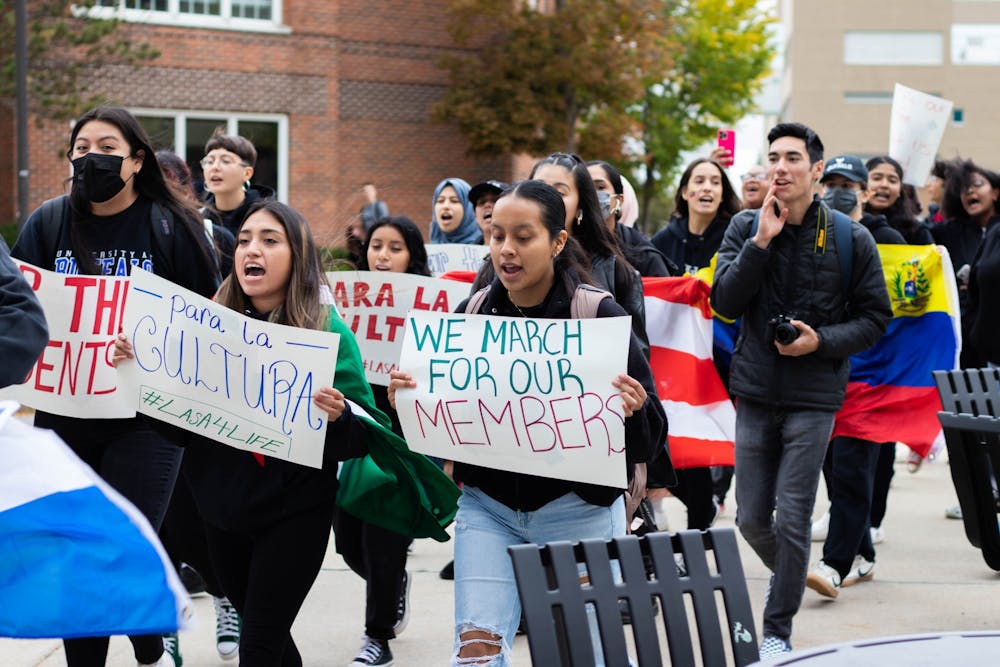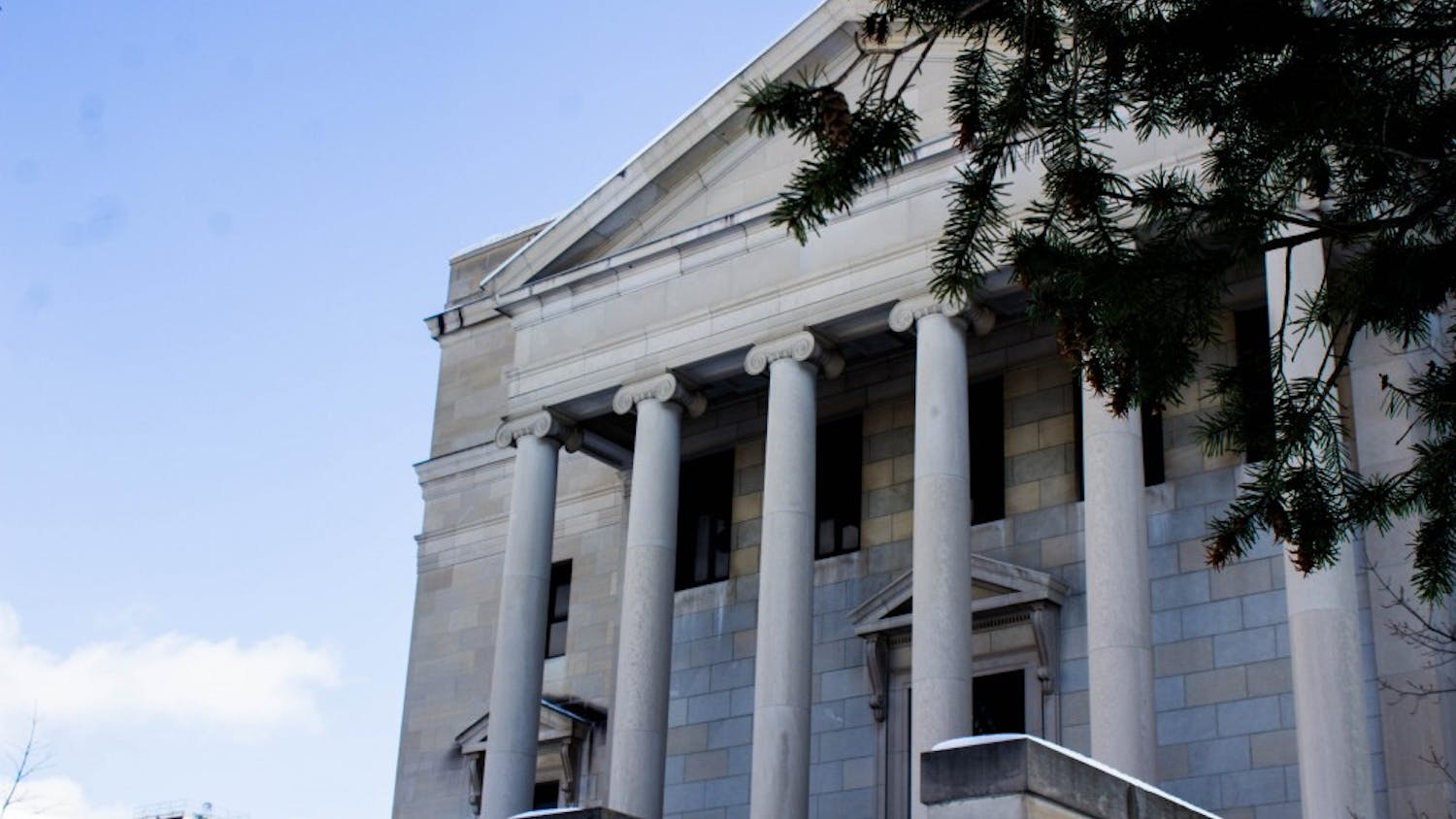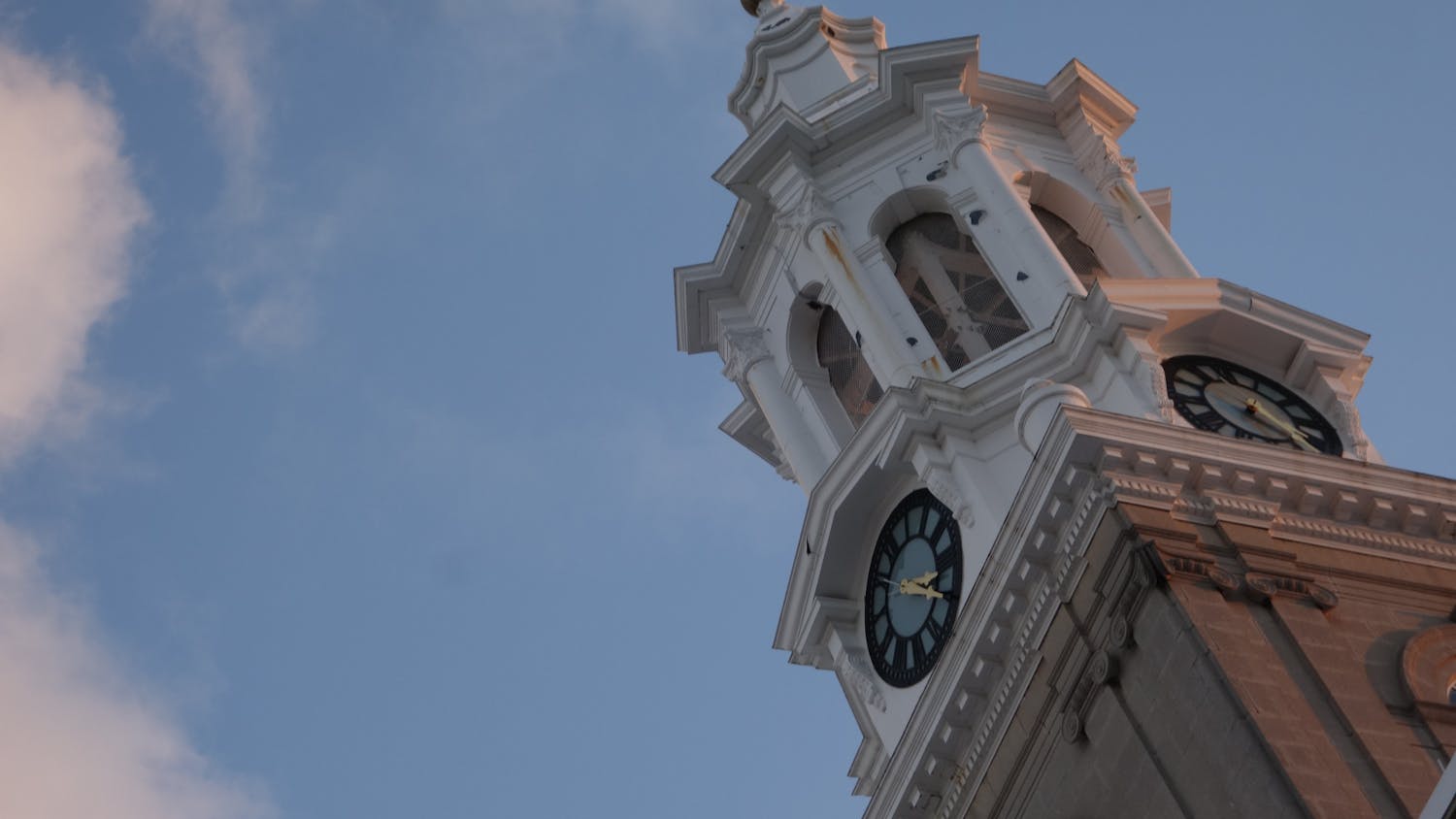The Latin American Student Association had been preparing for its 18th Annual Heritage Banquet, which “celebrates and commemorates” Hispanic Heritage Month, since the start of the semester.
The event coordinators had secured a venue and caterer, the dance performers had spent hours rehearsing and the club had promoted the event on social media. All LASA had left to do was get its ticket prices approved by the Student Association.
LASA submitted a proposal on Sept. 28, with intentions to sell 182 student tickets for no more than $26 and at least 50 general public tickets, popular among family members and LASA alumni, for $30.
But there was a problem.
SA emailed LASA the next day, telling the club that it could only sell 25 general public tickets rather than 50.
And then in an Oct. 4 email, the SA informed LASA of a price point correction — it would have to double the price of those 25 remaining general public tickets.
LASA’s proposals had run afoul of SA’s new Ticketing and Merchandise Sales Policy, which bars clubs from subsidizing non-student tickets with their club budget and caps the number of tickets they can give to non-students at 10% of total tickets available for sale. The SA Senate unanimously passed the policy as a part of a package late last March.
This left LASA with two options a week and a half before its biggest event of the year: relocate the event from the Marriott Hotel to somewhere on campus to save on venue costs or charge $60 for just 25 non-student tickets.
LASA e-board members said they had no choice but to raise the price and limit non-student tickets — no space on campus had the capacity for the 250 attendees they planned on inviting.
“For the last 18 years, the banquet has never been on campus, and that has never been an issue,” Yaide Valdez, a junior political science and law major, said. “They’re just not considerate of the hard work that we’re putting in behind the scenes.”
LASA members said they were frustrated with the SA’s late and sporadic communication, which sent LASA scrambling to successfully pull off the event despite major changes.
“They sent emails back and forth, but kind of fixed one thing at a time instead of just all at once,” Adrian Alvarez, the treasurer of LASA and a junior aerospace engineering major, said.
Representatives from the SA declined to comment on this or any other Spectrum story.
‘Don’t think that it doesn’t impact us undergraduate students’
There are 69 undergraduate Latina women in UB’s School of Engineering and Applied Sciences, according to the University Factbook.
Jaylean Ureña, the community outreach coordinator for LASA and a sophomore aerospace engineering major, is one of them.
Despite the lack of diversity in her program, she was able to secure a research opportunity, partly by using the alumni network and connections she cultivated at LASA.
“Just because these tickets are directly for graduate and non-UB students, don’t think that it doesn’t impact us undergraduate students,” she said. “We don’t have representation because, respectfully, this school does not provide for students of color. They heavily rely on our clubs and our organizations to provide for students of color.”
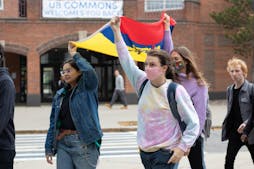
With UB being a predominantly white institution, LASA members argue that People Of Color (POC) council clubs provide community and opportunities to network with alumni, allowing Latino students to go further in their careers.
“For our organization, it’s really important to have these alumni networks because we allow them to support [us], not only professionally and academically, but as well as just running our day to day,” Kevin Corrales, the current LASA president and a senior mechanical engineering major, said. “So to have a policy like this that directly inhibits us from inviting them is very detrimental as a whole.”
Some alumni told LASA they had already traveled to Buffalo from New York City for the event, only to find out that their cost of attendance had doubled.
“They find it to be ridiculous,” Valdez said.
Many LASA members were also concerned that the high ticket prices would alienate alumni and family members with low incomes.
“This is my first year in the club and my family was thinking about coming when it was $30,” Maria Mendez, a freshman health and human services major and LASA member who comes from a five-member family, said. “But right now, they can’t afford to pay for tickets because it’s $60.”
Kathleen Leite, a former LASA president and senior communications major, was “extra excited” to attend the banquet one last time as a student.
Leite had picked out “an amazing outfit” and made plans to go with some of her other friends as a celebration of their efforts. But after LASA was forced to raise ticket prices and cap non-UB student tickets, her friends didn’t “feel comfortable showing up.”
Leite is now contemplating not going. She’s afraid her “experience will be less exciting” because she won’t be sharing it with those closest to her.
But the banquet is more than just a night of dancing and networking, LASA members say. It’s a source of community in a school where only 6.7% of students are Latino.
“When you’re first generation and you’re in a school where English is not your first language, sometimes you need an event where you’re just with your fellow Latinos: people who speak the same tongue as you, listen to the same music,” Ureña said.
‘For the students and by the students or against the students?’
LASA first went public about its concerns on Oct. 5 with an Instagram post entitled, “For the students and by the students or against the students?” playing off the SA’s slogan. The post explained the ticketing policy and how it would affect them.
LASA e-board members say they then spoke with SA pro-staff members about how the ticket policies would affect other POC clubs and suggested that the SA spread awareness about the new policy.
LASA e-board members say one pro-staff member told them that other clubs would deal with the policy “when their time comes.”
After that conversation, LASA members moved beyond social media to pressure the SA into amending the ticketing policies. The club protested the SA’s ticket regulations in an Oct. 7 demonstration that wound its way from One World Café to outside the SA’s office.
Protesting students, predominantly members of LASA and the Black Student Union, marched with the flags of various Latin American and South American countries on their backs, held homemade signs and chanted “Let us be, it’s our fee,” and “Your policy, we disagree,” through the halls of the Student Union.
“It is like our hands are tied and we’re their puppets,” Valdez said at the protest. “They [SA] want us to do whatever they want, not what we want.”
After marching from One World, Corrales, Valdez and BSU Vice President Taylor Lewis gave speeches emphasizing the importance of community for students of color and the university’s reliance on clubs like LASA to create a “diverse environment” to the 40 assembled protestors on the ground floor of the Student Union.
“We’re not fighting any administration in a student government,” Corrales said in a speech. “We’re fighting a policy, and we want to change it… But at the end of the day, the reason we’re here today is to incite change, beyond just one or two rules, all the way to the president’s office.”
After the speeches, protestors marched upstairs and chanted outside the SA office in the hopes of getting a response.
They got their wish. While they were gathered outside the SA office, the SA posted an official statement on its Instagram.
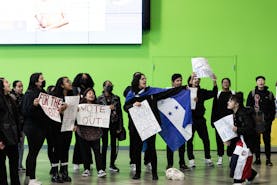
“We recognize the concerns that have recently been brought to our attention regarding the Ticketing and Merchandise Sales policy. We hear you,” the post read. “The policy in question does not impact current (undergraduate) students and was implemented by the 2021 SA administration to limit undergraduate student funding being utilized to benefit non-undergraduate students. The policy applies equally to all clubs and any implications otherwise are inaccurate.”
Shortly after the post went public, SA President Becky Paul-Odionhin beckoned Corrales, Valdez and Lewis into the office.
Paul-Odionhin told them that there was “nothing they [SA] could do in the moment” and to “send her an email.”
After their conversation, Corrales stated that LASA representatives would show up at the SA Senate meeting scheduled for the following Monday, Oct. 10, and encouraged other students to come “if they cared about the issue.”
LASA also started a Change.org petition calling on the SA to amend its ticketing policy in order “to give students the right to choose.” It has garnered 415 signatures.
SA president commits to meeting with LASA, drafting proposal to amend the policy
The SA Senate voted on council coordinator appointments, the senate chairperson and budget adjustments in its first meeting of the academic year on Monday, but the agenda lacked any references to LASA or the SA’s ticketing policy.
Paul-Odionhin told the room “that’s it” and was about to conclude the meeting until Student Affairs Director Ariel Clarke proposed a motion to “discuss the matter in which students on campus have not been acknowledged and appreciated as far as the situation with LASA.” Clarke, a senior criminology and political science major, also added that she had “previously discussed” adding the agenda item with Paul-Odionhin and Pang.
Nobody with the SA had prepared a specific resolution, and such a resolution would’ve required prior approval by at least two SA e-board members, according to the SA’s lawyer, Joshua Korman.
The senate instead focused on feedback from LASA members who attended the meeting, how the policy will affect other clubs in the POC council and beyond, the conflicting information that SA pro-staff gave to LASA and the best ways for the SA to get further feedback.
Parts of the discussion appeared to expose disagreements among members of the senate over whether the SA’s current ticketing policy has any merit.
“We should always be prioritizing undergraduates first,” Paul-Odionhin said. “Now, alumni, grad students, the UB community — they’re great and all. But if providing more to them becomes a disservice to other undergrads, we should also take that into consideration.”
Clarke immediately responded, arguing that “prioritizing undergraduates first” meant prioritizing the community members around them too.
“To prioritize and cater to them, you have to understand and welcome the people that are with them,” Clarke said. “It takes a village to bring individuals to universities like this, especially when you talk about individuals who are part of those [POC and international] clubs or even just anyone from across the board who comes from a certain socioeconomic status… You cannot say that we as UB SA prioritize and cater to UB undergraduates without acknowledging the fact that they are being harmed egregiously based on this policy and the fact that we’re excluding the people who come with them.”
Paul-Odionhin committed to meeting again with LASA members and using that feedback to put a proposal before the senate, but the 25-minute discussion on the ticketing policy ended after SA Treasurer Alana Lesczynski left to go to class, which broke quorum.
The senate voted to adjourn shortly afterward.
“I really appreciate everything you’re saying, and I understand,” Lesczynski told Ureña, who had just finished speaking about what LASA does for UB’s Latino community, before leaving the meeting. “So before I go, I do want to say, thank you guys so much for coming. I don’t want to say I understand because obviously I’m not in your position, but I can see everything that’s happening. Don’t think that we’re not going through this… We were literally in Becky’s office way past office hours, just going at the whiteboard, literally going at this policy.”
The next SA Senate meeting has yet to be scheduled.
CORRECTIONS: The Spectrum originally reported that SA President Becky Paul-Odionhin committed to putting a ticketing policy proposal forward at the next SA Senate. That is inaccurate. Paul-Odionhin committed to putting forward such a proposal but did not specify a timeline. We regret this error.
The Spectrum originally spelled Adrian Alvarez's last name as "Alverez." We regret this error.
Grant Ashley is the managing editor and can be reached at grant.ashley@ubspectrum.com
The news desk can be reached at news@ubspectrum.com
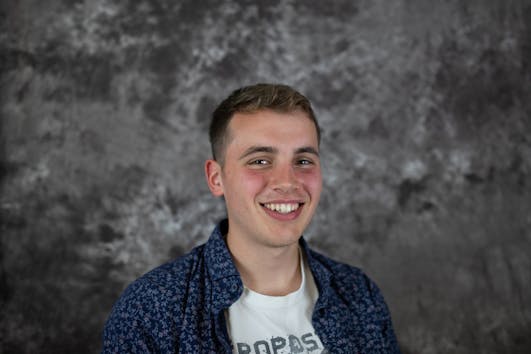
Grant Ashley is the editor in chief of The Spectrum. He's also reported for NPR, WBFO, WIVB and The Buffalo News. He enjoys taking long bike rides, baking with his parents’ ingredients and recreating Bob Ross paintings in crayon. He can be found on the platform formerly known as Twitter at @Grantrashley.

